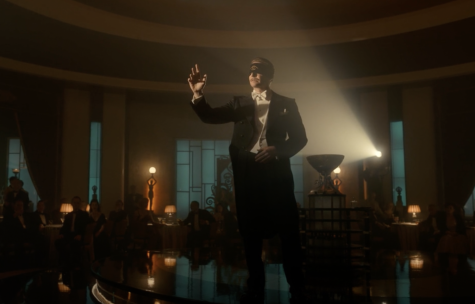‘Nightmare Alley’ Review: A Not-So-Merry-Go-Round
March 27, 2022

Spoilers included in this review
In a confusing opening scene, carnival actor Stan Carlisle (Bradley Cooper), drags a body bag into the basement of a house before setting it on fire. There’s no context for this seemingly misplaced scene until the ending of the movie, as the film dives right into Stan’s career as a mentalist.
From then on, “Nightmare Alley” tells the story of Stan’s journey across the nation as the handsome carnival actor advances a career that involves him tricking people into thinking he can read minds. Nominated for ‘Best Picture’ in the 2022 Oscars, the film is ready to leave its mark among notable neo-noir films.
For a good portion of the movie though, it doesn’t seem like it. The early plot points show Stan’s success in moving out of his shoddy carnival in the middle of the desert to perform shows with his new love interest in expensive-looking ballrooms. Elements of the neo-noir only show themselves in things like an abused, deranged man, who is treated like a zoo attraction, though even that is presented as if it isn’t anything unique.
The dark tones of the movie only become particularly noticeable at a very particular point halfway through the film, when one of Stan’s customers commits murder-suicide, believing she and her husband will be reunited with their dead son, who Stan pretended to connect with in one of his sessions. The event is only the first in a series that escalates in intensity and darkness as he falls into a panic to keep his successful life together. One high-profile customer eventually discovers his act is a fluke, and before he gets exposed, Stan commits two murders.
The slow pace of the movie works strongly to its disadvantage, being a painstakingly long build-up for the more pertinent part of the plot. Stan’s character stays relatively the same for the majority of the movie, constantly looking to improve his own life at the behest of others.
Yet, the plot’s downturn does reference earlier parts of the movie to show the irony: Stan ends up in a position much worse than he started. He escapes into a freight train full of chickens at the end and turns into an alcoholic, subjecting himself to the worst, most dehumanizing parts of carnival fairs as he becomes irrelevant to the rest of society.
Clever elements of scriptwriting shine brightly in the final 10 minutes when Stan gives away his most prized possession, his father’s watch, to obtain just a small sip of alcohol, which he fervently stood far away from the entire movie. Like a merry-go-round, he’s come full circle, from the mentalist taking advantage of others to the victim of his own carnival tricks.
Despite the overextended beginning of the movie where the tensions build and nothing significant to the plot happens, the irony in the satisfying ending makes it all worth it. More broadly, the creeping message of the film — of how people enjoy seeing others’ suffering — resonates beyond the characters, applying directly to the audience.
“Nightmare Alley”
2 hours, 20 minutes.
Rated R.
Directed by Guillermo del Toro. Starring Bradley Cooper.


